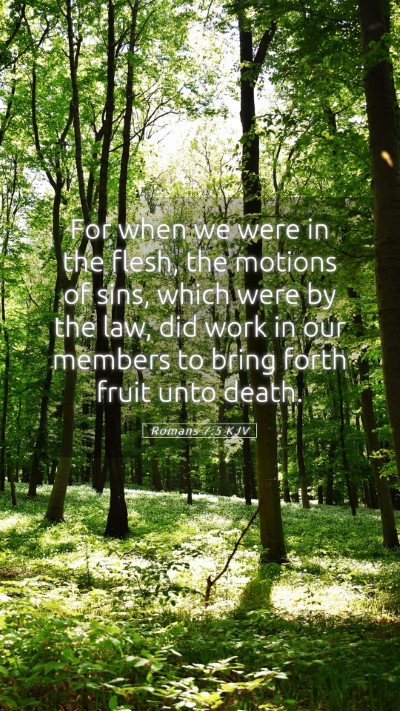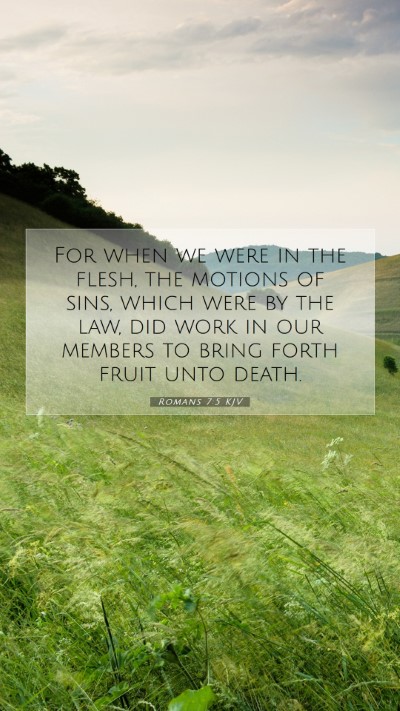Old Testament
Genesis Exodus Leviticus Numbers Deuteronomy Joshua Judges Ruth 1 Samuel 2 Samuel 1 Kings 2 Kings 1 Chronicles 2 Chronicles Ezra Nehemiah Esther Job Psalms Proverbs Ecclesiastes Song of Solomon Isaiah Jeremiah Lamentations Ezekiel Daniel Hosea Joel Amos Obadiah Jonah Micah Nahum Habakkuk Zephaniah Haggai Zechariah MalachiRomans 7:5 Meaning
What is the meaning of Romans 7:5?
For when we were in the flesh, the motions of sins, which were by the law, did work in our members to bring forth fruit unto death.
Romans 7:5 Bible Verse Meaning
Understanding Romans 7:5
Bible Verse: Romans 7:5 - "For when we were in the flesh, the motions of sins, which were by the law, did work in our members to bring forth fruit unto death."
Meaning and Interpretation
The Apostle Paul, in this passage, speaks of the state of humanity under the law and the inherent struggle with sin that arises from our sinful nature. The "flesh" refers not merely to physical existence but to our fallen nature, which opposes the spirit. The commentary on this verse unveils several profound insights:
- Human Nature: Matthew Henry explains that Paul illustrates human weakness in the face of sin. The "motions of sins" signify the stirring up of sinful desires that the law inadvertently provokes, showcasing the weakness of our carnal nature.
- Role of the Law: Albert Barnes notes that the law serves to bring knowledge of sin, revealing human transgressions and leading to a realization of our need for redemption. The law does not empower us to overcome sin; instead, it often brings forth our sinful impulses.
- Consequences of Sin: Adam Clarke elaborates that the result of living in the flesh and under the law is death, depicted as both spiritual and eventual physical death. The "fruit unto death" illustrates the eventual outcome of a life in rebellion against God's commands.
- Spiritual Conflict: The verse encapsulates the internal struggle where the law combats the natural inclinations of humanity, creating a compelling backdrop for our spiritual journey.
Biblical Context
For a robust understanding, we must consider the surrounding context of Romans 7. Paul explains how the law was intended to guide but instead revealed the depth of sinfulness within us:
- Romans 7:1-4: The preceding verses highlight our relationship with the law and how we have died to it through Christ, signaling a move from the old covenant to a new existence in the Spirit.
- Romans 8:1: Following this passage, Paul reassures believers that there is no condemnation because those who are in Christ are set free from the law of sin and death.
Applying the Verse to Daily Life
Understanding Romans 7:5 enhances our perspective on sin and salvation. This verse invites us to reflect on:
- Transformation in Christ: Accepting Jesus allows us to confront and overcome the sinful nature that Paul describes.
- Dependence on Grace: It is vital that we recognize our need for grace, as knowing the law’s commands can lead to despair without Christ’s redemptive work.
- Living Spiritually: We are called to seek life in the Spirit, which empowers us to bear good fruit, contrasting sharply with the fruit that sin produces.
Cross References
Romans 7:5 resonates with several other scripture passages that elaborate on similar themes:
- Galatians 5:17: Discusses the conflict between the flesh and the Spirit.
- Romans 6:23: Highlights the wages of sin being death.
- 1 Corinthians 15:56: Talks about the strength of sin being the law.
Conclusion
In summarizing Romans 7:5, we grasp the complexities of our human struggle with sin, the role of the law, and the necessity of Christ's redeeming work. This understanding not only deepens our Bible verse commentary but also reinforces the foundational aspects of Bible study insights that can be leveraged in Bible study groups and personal reflection. The exploration of this verse underscores the importance of biblical exegesis and the transformative power of understanding Scripture.


